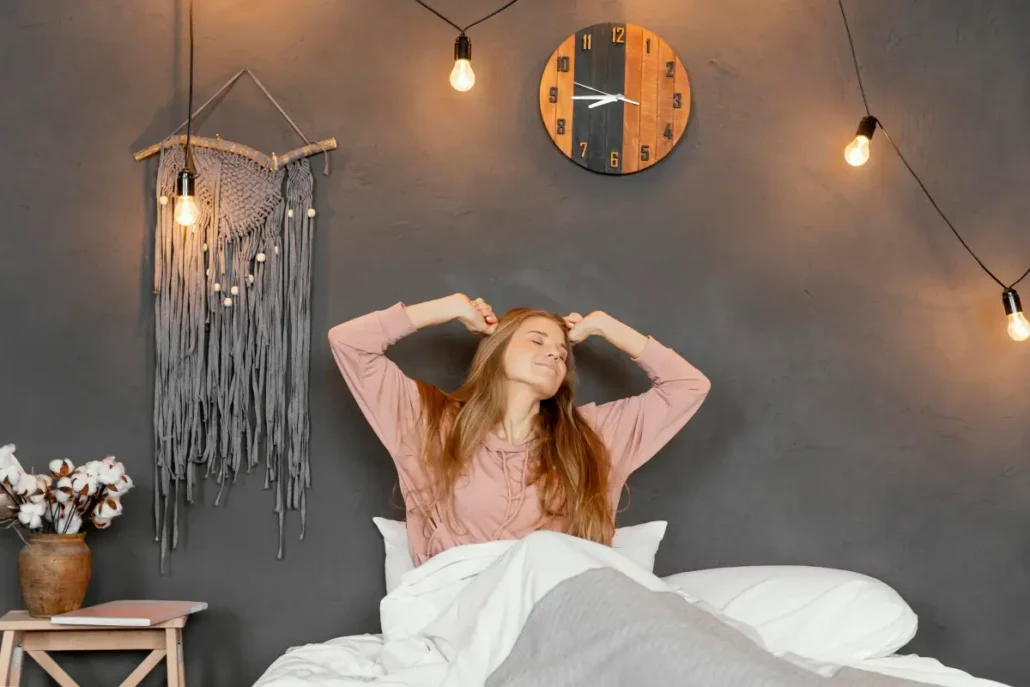Sleeping Through Stress: How to Improve Sleep When Life Feels Overwhelming
Our bodies and minds need a nighttime break from the stress of daily life.
Stress is sneaky. It shows up in our bodies, our moods—and yes, in how we sleep (or don’t). In today’s nonstop world, it’s no wonder so many of us are feeling the pressure. But just how bad is it? Before we dive in, check out a few eye-opening stats from recent Better Sleep Council surveys that reveal just how closely stress and sleep are connected.Better Sleep Council surveys:
- 19% of individuals ages 45-64 admit to losing sleep due to stress a few nights per week
- 26% of women and 16% of men report trouble sleeping at least once a week
- 19% of children whose parents say they are poor sleepers have recently experienced stress in their lives.
- School is the leading cause of stress among teenagers, with 75% of respondents stating grades or tests and 75% saying homework.
With alarming statistics like these—it is clear! Sleep and stress don’t mix. Whether you’re juggling work commitments, family responsibilities, or academic pressures—focusing on simple yet effective strategies can help you reclaim your sleep and navigate life’s challenges with ease. Understanding the connection between stress and sleep can pave the way for healthier, more restful nights.
Understanding Stress and Its Impact on Sleep
Stress is a natural reaction to changes or challenges in our daily lives. Thankfully, our bodies and minds can respond in ways that help us adjust to stressful situations—whether that’s during our daily routine or nightly sleep patterns. For example, if you’re driving and an animal runs into your path, the instinct to slam on the brakes is a reaction to the stressor. In this scenario and many others, stress helps keep you alert and avoid danger.
When stressful situations continue without rest periods, stress becomes problematic and can lead to poor sleep.
Stress and the Body’s Sleep Cycle
Work. School. Family. Finances. Health. These things can keep us awake at night worrying about potential outcomes or how to best solve a situation. Stress impacts:
- Sleep Latency: The amount of time it takes to fall asleep.
- Sleep Quality: Uninterrupted, refreshing sleep that leaves us rejuvenated.
- Sleep Duration: The recommended amount of sleep (for adults, it’s at least seven hours).
When you experience disruption in any of these areas, it can trigger our body’s stress response system, elevating the stress hormone cortisol and disrupting sleep. The loss of sleep can impact learning and memory, and chronic sleep deprivation can cause endocrine dysfunction and decreased metabolism.
Signs You’re Too Stressed to Sleep Well
Both short-term and chronic stress can take a toll on your mind and body, which can result in physical, psychological, and behavioral symptoms. When you’re experiencing stress, it’s important to be aware of these symptoms and speak to your healthcare provider if they persist:
- Physical: Aches/pains; Chest pain/racing heart; Exhaustion/trouble sleeping; Headaches/dizziness/shaking; High blood pressure (hypertension); Muscle tension/jaw clenching; Stomach/digestive problems; Trouble with intimacy; Weakened immune system.
- Psychological: Anxiety or irritability; Depression; Panic attacks; Sadness.
- Behavioral: Alcohol use disorder; Gambling disorder; Compulsively sexual, Doomscrolling; Overeating/developing an eating disorder; Shopping; Smoking; Substance use disorder.
Stress-related Sleep Disorders and Coping Mechanisms
An astonishing number of Americans have a sleep disorder—more than 50 million. The lack of adequate sleep due to sleep latency, quality, or duration caused by stress has the potential to cause sleep disorders. Of the more than 80 types of sleep disorders, a few of the most common caused by stress include:
Trauma-induced Insomnia
This type of insomnia is characterized by hyperarousal—heightened alertness with or without anxiety—resulting from a traumatic event. Trauma-induced insomnia is a symptom of post-traumatic stress disorder (PTSD). It often comes to light after more stressful symptoms have dissipated. Recent research shows that the fear of sleep causes trauma-induced insomnia.
How to Cope
Cognitive behavioral therapy for insomnia (CBT-I) is the primary way to treat trauma-induced insomnia. CBT-I helps you learn how to control or stop negative thoughts that prevent you from getting quality sleep.
The cognitive part of CBT-I specific to trauma helps you understand your troublesome beliefs relating to sleep so you can make the necessary changes. CBT-I also focuses on learning new behaviors and habits to help you sleep better. These can include:
- Changing your sleep routine so you fall asleep and wake up on a consistent schedule. It may involve forgoing afternoon naps and limiting the use of the bed or bedroom to sleep or sex only.
- Setting sleep limits to keep yourself from lying in bed for hours unable to sleep. A general rule is to get out of bed if you’ve been unable to sleep for more than 20 minutes and don’t lay back down until you’re tired.
- Changing lifestyle habits like smoking, drinking caffeine in the afternoon, drinking too much alcohol, and not exercising regularly. Try to wind down these activities at least one to two hours before bed.
- Remaining passively awake without thinking about falling asleep. You can train your mind to let go of stress or worries to make getting the Zzzs you need easier.
- Using a biofeedback device to track your heart rate and muscle tension. A sleep specialist can track patterns that are disrupting your sleep.
Sleep Anxiety
Excessive worry about sleep is the primary symptom of sleep anxiety. Suffering from sleep anxiety can create a vicious cycle of habits that interfere with sleep patterns. Sleep anxiety may be an issue if you:
- Have a hard time falling asleep
- Wake up frequently during the night
- Have racing thoughts at night
- Have nightmares or disturbing dreams
- Frequently fight daytime fatigue
How to Cope
Changing habits and doing activities that calm your mind and body are good ways to overcome sleep anxiety. Try creating new habits such as:
- Taking a warm bath before bed
- Listening to white or pink noise
- Practicing yoga
- Limiting screen time at least an hour or two before bed
- Journaling about your stress, worries, or daily tasks
Restless Legs Syndrome
Restless legs syndrome (RLS) is characterized by the urge to move your legs while resting or sleeping. It can severely affect your sleep and increase the severity of depression. The disorder affects the nervous system and muscles, which can cause your legs to feel sensations like creeping, crawling, tingling, or pulling.
How to Cope
Speak to your healthcare provider if you believe you may have RLS. They can help determine the appropriate treatment based on the severity of RLS. A few of the options include:
- Establishing and maintaining good sleep habits during the day and night.
- Eliminating activities that worsen RLS symptoms, such as drinking caffeine or alcohol.
- Establishing a regular, moderate daily exercise routine.
- Maintaining a well-balanced diet of iron-, magnesium-, and folate-rich foods.
Hypersomnia
Hypersomnia is any condition that makes you extremely tired during the day. Taking an afternoon cat nap every so often is not a symptom of hypersomnia. However, being unable to control when or where you fall asleep during the day certainly is. Hypersomnia often occurs after busy activities such as long work meetings, social engagements, or even running errands.
How to Cope
Healthcare providers typically recommend medications to help you stay awake combined with changes to your sleep habits, such as:
- Improving your sleep hygiene with habits that help you get restful and rejuvenating sleep every night. Establishing bedtime routines, sprucing up your sleep environment, avoiding heavy evening meals, and waiting until you’re tired to go to bed are good ways to prioritize sleep hygiene.
- Working with a therapist to explore causes of stress. A therapist can help you get more in tune with your feelings and understand how hypersomnia affects your daily life.
Navigating the delicate interplay between stress and sleep is crucial for our overall health and well-being. Stress can be an unavoidable part of life. We can reclaim restful nights and rejuvenated days with the right strategies and awareness.
Prioritizing sleep hygiene, seeking professional support, and addressing the root causes of stress can significantly improve our sleep quality and mental health. Remember, it’s essential to listen to your body and mind—when stress takes its toll, taking proactive steps can lead to a healthier, more balanced life.
Embrace these strategies, and take the first step towards better sleep so you can wake up each day feeling refreshed and ready to tackle whatever challenges come your way. A peaceful night’s sleep is not a luxury; it’s a fundamental cornerstone of a vibrant, fulfilling life.



